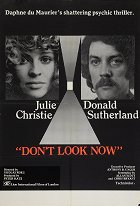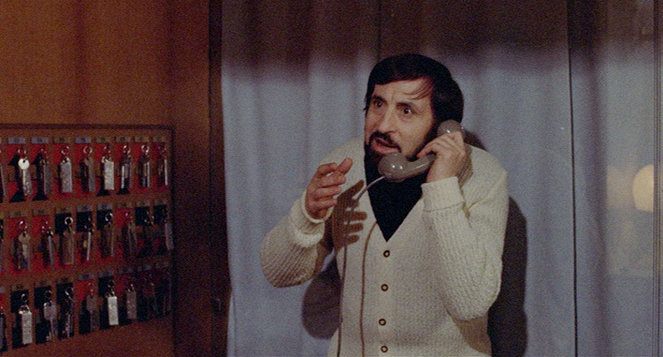Rendező:
Nicolas RoegOperatőr:
Anthony B. RichmondZeneszerző:
Pino DonaggioSzereplők:
Julie Christie, Donald Sutherland, Hilary Mason, Massimo Serato, Renato Scarpa, Leopoldo Trieste, Clelia Matania, Giorgio Trestini, Bruno CattaneoTartalmak(1)
John és Laura Baxter Velencében élnek és dolgoznak. Megpróbálják túltenni magukat kislányuk tragikus halálán. Két spiritiszta vénkisasszony feljánlja, hogy segítenek nekik kapcsolatba lépni a vízbefúlt gyerekkel. John elutasítja az ötletet, pedig álomszerű vizióiban gyakran felbukkan a lány, amint az utcákat rója kis piros esőkabátjában, s ilyenkor feleségét is látja a halottas gondolán… (MTVA)
(több)Recenziók (6)
A perfect example of your typical atmospheric Euro-horror from the 1970s. Unfortunately for me, I was already quite tired before watching it and the film only made things worse. The story is terribly slow, the runtime is unnecessarily long and there aren’t any strong scenes at all. Don’t Look Now could have been a lot better, it’s got the basis for that, unfortunately, though, it stopped halfway.
()
Well I did look… especially at the soft porno scene, which they say shocked the world at that time. And I am not surprised. You see, it’s the only thing about the movie that’s any interesting. All the rest is incredibly boring despite the pretty interesting premise.
()
“Don’t Look Now" by Daphne du Maurier is about making somebody unsure, sowing the seeds of paranoia, and a married couple in crisis in Venice. They searched in vain for some tourist-free, but still crowded back alleys that at misty dawn or dusk give you an impression that you are in a totally different city. “Don’t Look Now" by Daphne du Maurier is not about making somebody unsure, sowing the seeds of paranoia, and a married couple in crisis in Venice. Tourist-free or otherwise. Daphne du Maurier’s story is a punchy, fifty-page tale. Roeg’s adaptation is simply routine and almost two hours long. And those are fundamental mistakes. It’s not boring only thanks to Sutherland, naked Julie Christie, the ending bit and the color red.
()
I can't say that I am completely dissatisfied with this. The film offers solid acting and scenes literally filled with tension and anticipation of hidden threats. However, the above only applies to individual scenes. They can maintain within themselves a remarkable atmosphere, but that does not apply to the film as a whole. It is somewhat scattered and unfinished. It's as if the director and cameraman lacked a bit of cinematic sense. Throughout the film, it creates the impression of great expectations that it cannot or does not want to satisfy. The most interesting aspect is the camera wandering through the winding Venetian alleys, arcades, and corridors, but from a plot point of view and in terms of the ending, it is unsatisfying. Overall impression: 55%.
()
An incredibly focused portray of psychological decay with a story that is not nearly as empty as it may seem. Roeg does a flawless job with the simultaneous course of two different actions that often happen within a single, spatially bound scene, and the deconstruction takes place at the very moment when those actions deviate significantly from each other (like the girl from her parents in the first scene). The story of the characters was not always fun to watch, but the finale is not about them, it’s rather about the environment itself and its role in the complicated coexistence of two internally broken spouses played wonderfully by Christie and, especially, Sunderland. A little introverted and hard to grasp at times, but a successful and important representative of European modernist horror nonetheless. I never noticed how creepy Venice is. 75%
()
After the unfortunate drowning of their daughter, a British couple go to Venice for work and try to forget the tragic event. But a series of mysterious events constantly remind them of their child's death. A hypnotic ghost story without ghosts, with an amazing kaleidoscope of fragmented visions and unsettling hints of escalating menace in the dark corners of Venice's alleys. The film, like Venice, is a labyrinth with dead ends, where there is no direct path to answers. It is a horror film about grief and the inscrutable hand of fate that gradually leads the protagonist to disaster. To properly appreciate Nicolas Roeg's masterpiece, you'll have to see it at least once more.
()

